
- 14th July 2025
- Back to All News


We're seeking to appoint a partner to undertake a standalone research study focused on understanding the role of childcare support in tackling economic inactivity across our sub-region.
As part of our wider Economic Inactivity Trailblazer (EITB) initiative, funded by the Greater London Authority (GLA) via the Department for Work and Pensions (DWP), this research will inform future programme delivery, influence policy development, and support system change around how childcare is aligned with employment and economic participation for residents not currently supported by traditional welfare-to-work offers.
Local London is one of three sub-regional partnerships delivering Economic Inactivity Trailblazers in London funded through the Greater London Authority (GLA) by the Department for Work and Pensions (DWP), under the national Get Britain Working initiative. Up to £7 million has been allocated to Local London to test new approaches to reducing economic inactivity.
The Local London Trailblazer consists of three interlinked delivery streams:
· Economic Inactivity Support Programme.
· Business Startup and Self-Employment Support.
· Childcare Support Fund.
⇒ Read about Trailblazers in Local London
The research will:
· Map the current childcare support landscape for economically inactive parents within the Local London sub-region.
· Identify systemic, financial, policy and service delivery barriers to accessing childcare support, particularly for parents not on Universal Credit or work-search related benefits.
· Examine the impact of childcare access on the employment and training decisions of parents—especially mothers and carers.
· Assess the availability of flexible jobs across the Local London sub-region which may be more suited to parents and carers.
· Provide actionable recommendations to improve integration between childcare, employment and skills provision and health and other wraparound services.
· Contribute evidence to the pan-London Trailblazer’s wider systems change goals and the policy design of future employment provision.
Visit London Tenders Portal: www.londontenders.org
ITT Reference: DN782427
Deadline for submissions: Friday 1st August 2025 17:00
Deadline for clarification questions: Thursday 25th July 2025 17:00
Contract start date: September 2025 (mandatory)
Budget: up to £80,000
Contact: Portal only www.londontenders.org
In the interests of fairness to all parties, all correspondence must go through the portal. It is free to set up an account, but you must be registered to view these and other opportunities.
For more information and to respond to this invitation to tender please visit London Tenders Portal.
Discover our other invitations to tender.

We're seeking to appoint a partner to carry out an independent evaluation of our Economic Inactivity Trailblazer programme.
Local London is one of three sub-regional partnerships delivering Economic Inactivity Trailblazers in London funded through the Greater London Authority (GLA) by the Department for Work and Pensions (DWP), under the national Get Britain Working initiative. Up to £7 million has been allocated to Local London to test new approaches to reducing economic inactivity.
The Local London Trailblazer consists of three interlinked delivery streams:
· Economic Inactivity Support Programme.
· Business Startup and Self-Employment Support.
· Childcare Support Fund.
⇒ Read about Trailblazers in Local London
We're looking for a partner to use a range of qualitative and quantitative evaluation methods to report on the programme. The evaluation will help:
· Assess the effectiveness of the interventions designed as part of the Local London Trailblazer programme to reduce economic inactivity.
· Assess the effectiveness of the delivery approach and model led by Local London (which includes a combination of direct delivery and commissioning of activity.)
· Assess the effectiveness of partnership, collaboration and engagement between Local London boroughs, health and skills providers, employers and businesses to support economically inactive residents.
· Inform future scaling of effective models across London.
· Shape the design and delivery of Connect to Work in the Local London sub-region and future DWP-funded employment programmes.
· Strengthen alignment between employment, health, and skills systems.
· Contribute to national policy through robust evidence of “what works.”
We are seeking submissions that reflect the complexity of evaluating a multi-borough, multi-partner programme and offers practical insight to support ongoing learning and delivery refinement.
Visit London Tenders Portal: www.londontenders.org
ITT Reference: DN782413
Deadline for submissions: Friday 1st August 2025 @ 17:00
Deadline for clarification questions: Friday 25th July 2025@ 17:00
Contract start date: September 2025 (mandatory)
Budget: A maximum of £95,000 (inclusive of all costs, travel and VAT)
Contact: Portal only www.londontenders.org
In the interests of fairness to all parties, all correspondence must go through the portal. It is free to set up an account, but you must be registered to view these and other opportunities.
For more information and to respond to this invitation to tender please visit London Tenders Portal.
Discover our other invitations to tender.

The Local London Youth Summit on 25 June 2025 kick-started a new initiative that aims to address youth employment issues across nine boroughs in London.
Advancing Local London’s Youth Integration Network which forms part of the London Trailblazer Programme, a £30m investment across the capital through the Mayor of London to support the Government’s Get Britain Working strategy, the event brought together over 175 young people and representatives from a broad cross section of organisations that will play a role in helping young people find good work.
Young people, educators, employers, youth support professionals, joined forces to discuss the biggest challenges affecting young people’s employment prospects within the Local London sub-region, where approximately one in seven young people are not in education, employment, or training.
Discussions at the event built on research conducted by leading social change experts, Renaisi, into local pressures and challenges, including:
These themes that were not lost on Chisola Chitambala, a popular candidate on the most recent series of the BBC’s “The Apprentice”, who advocated passionately at the Summit for giving young people opportunities to start their careers.
Addressing the audience, Chisola said “Too often, young people are seen as statistics, not stories. As risk, not resource. As cost, not creativity. But I believe that when we change how we see young people, we change everything. Let’s shift the question from: “Are they ready for the workplace?” to “Is the workplace ready for them?” Let’s stop defining success only by grades or degrees. Let’s start celebrating grit, empathy, and lived experience. Because those are the skills that will define our future. This isn’t just about employment. It’s about showing a generation that they are not a risk — they are an asset.”

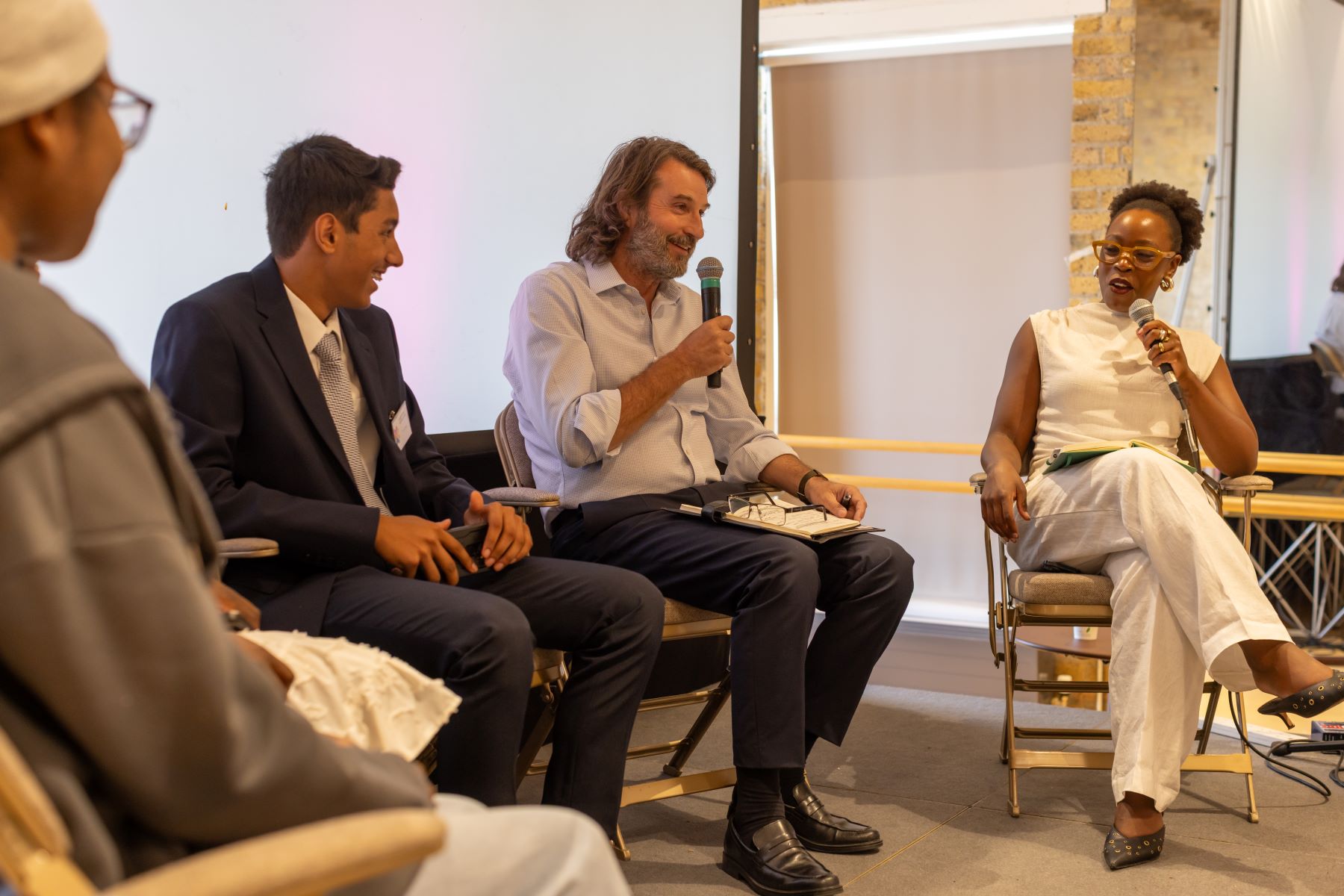
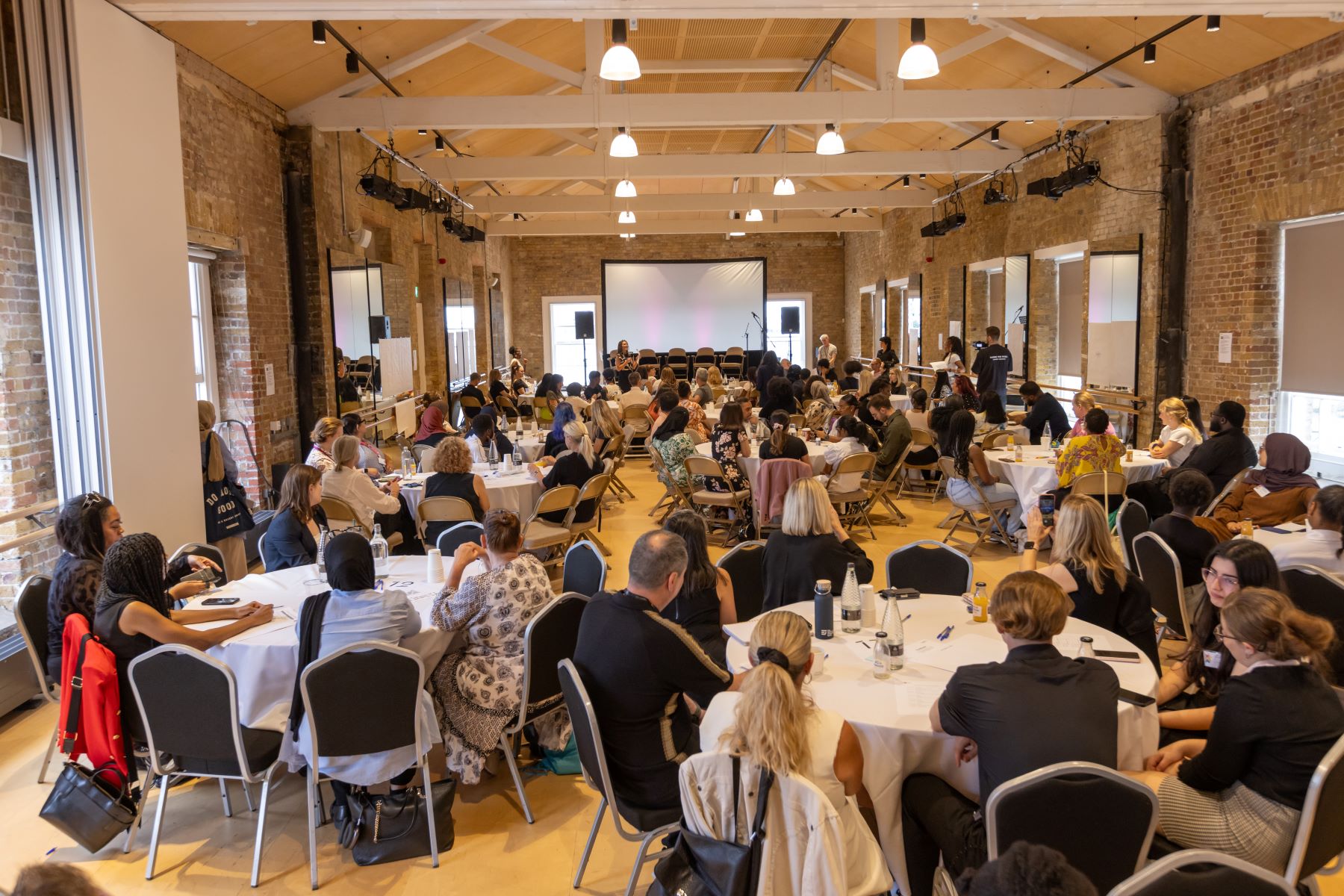
Lively discussions at the event ensured that all attendees shared reflections, with many attendees making the most of the opportunity to build vital cross-sector connections.
One of the many young people at the event, Nusayba, said “I appreciate the exposure to meet a range of different people. It allows us as young people to flourish and network in a positive environment where we know we are being heard and seen, and know we can actually make a difference.”
Jacqui, who works in the finance sector, commented “I liked that there were so many inspirational organisations and young people. It was great to share best practice and gain new ideas.”
Closing the day, Forogh Rahmani, Director of Local London, said “This summit has been an important next step to help dismantle barriers to employment for young people in our sub-region. We must keep this conversation alive and continue talking to each other. Across our boroughs we are supporting young people and adults to get into good work. We welcome a broad spectrum of businesses, organisations and experts getting involved with this and other aspects of our work. It is going to take all of us to make the changes we want to see.”
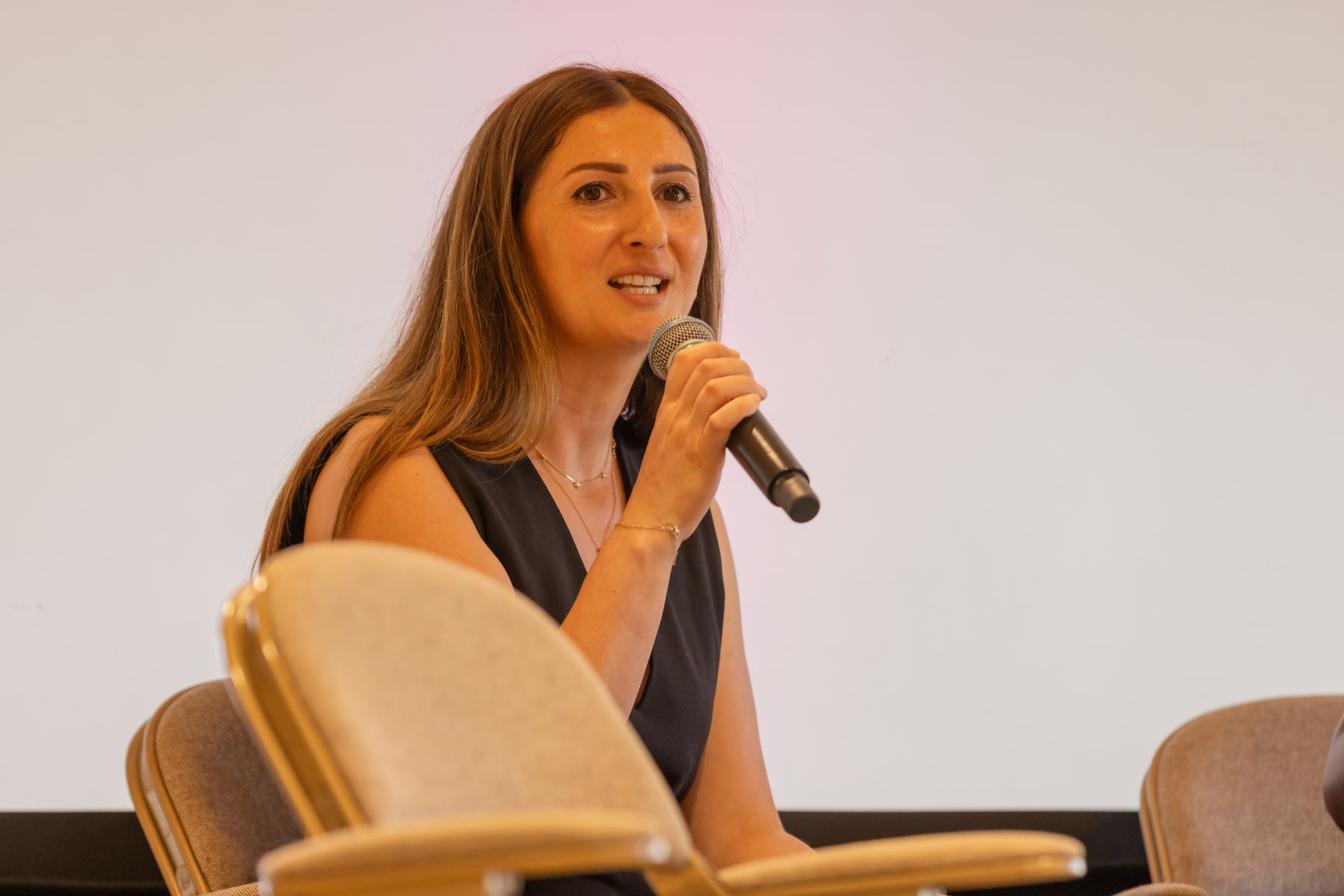
The findings of the research and Youth Employment Summit will be published as a report and action plan by Local London later in the year. This will shape approaches to address youth employment at a sub-regional level across Barking and Dagenham, Bexley, Bromley, Enfield, Greenwich, Havering, Newham, Redbridge and Waltham Forest.
Young people and professionals looking to take forward these actions are encouraged to join the Local London Youth Integration Network. Please visit local.london/contact-us/ or email hello.locallondon@redbridge.gov.uk mentioning ‘Youth Integration Network’ to find out more.
Our team are creating a growing directory of resources and opportunities on workconnections.london to help people looking for work or career advice, businesses and employment advisors connect people to jobs.

ITS and Local London convene leaders to support inclusive growth and strengthen the case for digital investment across London’s fastest-growing boroughs.
A clear message is taking shape among public and private sector leaders: to unlock Local London’s digital potential, we need stronger collaboration, clearer national policy, and a louder, united voice to put the sub-region’s priorities on the map.
That was a standout takeaway from a recent cross-sector conversation hosted jointly by ITS — operator of the UK’s largest dedicated business-grade full fibre network – and local authority group, Local London. The session brought together senior voices from local government, industry, and regional organisations to explore how digital infrastructure can drive economic growth, improve public services, and deliver inclusive opportunity across Local London.
Local London — a sub-regional partnership of nine boroughs — is home to 2.6 million residents and 100,000 businesses, making it larger than the cities of Birmingham, Manchester and Liverpool combined. It is also London’s fastest-growing area, yet investment in digital infrastructure has not kept pace. More than 114,000 homes and businesses across the boroughs still lack access to gigabit-capable connectivity.
Above all, attendees stressed the need for a unified narrative. While many boroughs are leading valuable local initiatives, leaders agreed that a more compelling, collective story must be told — one that links digital infrastructure directly to wider outcomes in education, skills, mobility, housing, and innovation.
This shared voice, they argued, is essential to unlocking national recognition and securing the long-term investment needed to drive fair, sustainable growth.
The conversation built on the ambitions set out in the Fair Economic Growth through Digital Connectivity paper from Thames Estuary Growth Board, which positions the region as the UK’s next AI and digital powerhouse. Sharing geography and ambitions with the Thames Estuary, participants supported the report’s call for bold public-private collaboration to accelerate progress across the region.
Local London is seeking investment across its boroughs to:
⇒Read our Delivering Economic Growth in Local London: Digital Connectivity Requirements paper.
“There is real opportunity across this part of London and the wider Estuary corridor,” said Daren Baythorpe, CEO of ITS. “The boroughs that make up Local London have the scale, the ambition, and the economic weight to help lead the UK’s digital future — but this can only be realised if we get the right infrastructure in place. We were pleased to support a conversation focused on moving forward, together.”
Mayor Rokhsana Fiaz OBE, Chair of Local London’s Growth Board that leads on digital and Mayor of Newham, reinforced this direction:
“Digital inclusion is vital for people in our boroughs. Yet across Local London there are over 100,000 premises with no or only the lowest level of digital connectivity and this is curtailing opportunities for people and businesses.
That’s why we are committed to working with private and public sector partners to close this digital divide. It is only through wide collaboration and appropriate investment that we will bring high-speed connectivity to east London, and out into the Thames Estuary. This is fundamental for digital inclusion and our joint vision to lead the UK’s AI and digital future.”
ITS remains committed to supporting Local London’s ambitions — by convening conversation, sharing delivery insight, and contributing to the infrastructure required to build a more connected, resilient, and inclusive future.
Mayor Rokhsana Fiaz OBE, Chair of Local London’s Growth Board that leads on digital is the Mayor of Newham and also Data and Innovation lead for London Councils. She will be one of our Leaders speaking at UKREiiF – the UK’s leading real estate infrastructure and investment forum – in Leeds 20-22 May 2025.
Discover more about our digital infrastructure asks.

• Government funding for five employment support trailblazers in the capital
• Young Londoners and people with health conditions set to benefit
• Designed to get more people back into work and boost economic growth
A new £30m investment will help young Londoners and people living with health conditions overcome barriers to employment through Get Britain Working trailblazers.
The UK Government funding will enable the Mayor of London and London boroughs to deliver five innovative new programmes in the city.
Three programmes will support unemployed Londoners who face barriers to getting jobs – including disabled people, those with long term health conditions and people from underrepresented groups – while the other two will support young Londoners not in employment, education, or training, including care leavers.
Work and Pensions Secretary, Liz Kendall, said: “With so much talent and potential across our capital city, we want to help all young people thrive and reach their potential.
“That’s why we are investing £30million in our Youth Trailblazers scheme in London to support more young people, including those with disabilities and long-term health conditions, into work.
“In addition, our Youth Guarantee will ensure all 18-to-21-year-olds will get the chance to study, train or work. This is a key part of our Plan for Change, which will put more money in people’s pockets and make everyone better off.”
Cllr Antony Okereke, Chair of Local London and Leader of the Royal Borough of Greenwich said:
“London is growing eastwards, and with a GVA of over £50bn per annum, Local London sub-region is an economic powerhouse. The opportunities are huge, but not all our residents benefit from what's available on their doorstep. We have more people who are out of work than the rest of the capital. The reasons for this are multi-faceted, but we know that women, people with disabilities and long-term health issues, and carers are disproportionately affected.
“I'm delighted that Local London will be leading one of the trailblazers in the capital as part of the Government's plans to Get Britain Working. Working with the Mayor of London and Government, we have secured £7million devolved funding for our boroughs to trial new approaches to help our residents overcome barriers to work and to transform their lives.”
⇒ Read about Trailblazers in Local London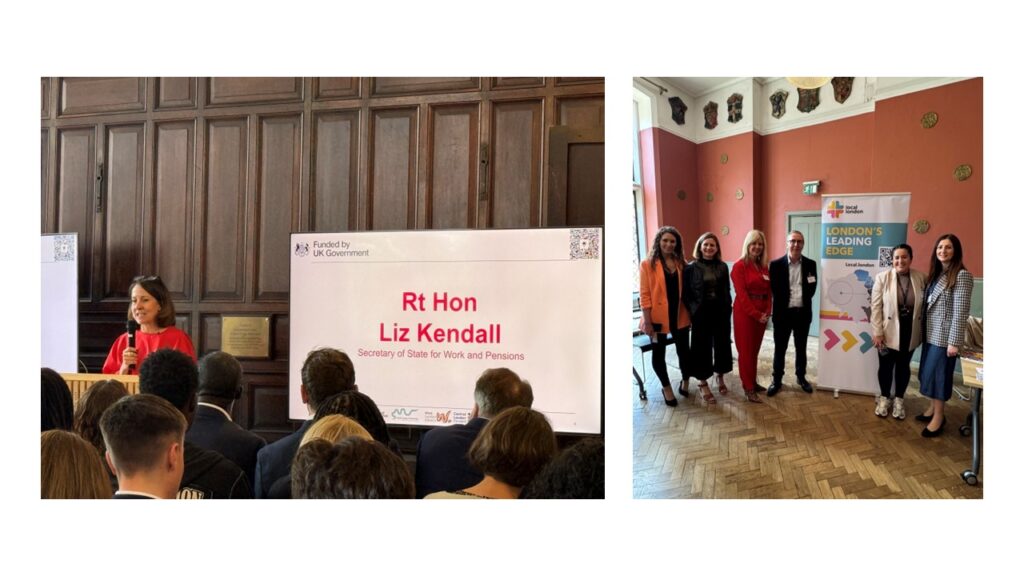
The Get Britain Working Trailblazers focus on joining up existing local services in the employment, health and skills, and youth industries to get people into work. The five programmes will work with more than 5,000 Londoners over the course of one year and will use innovative approaches including:
The schemes will support the London Growth Plan, launched by London Councils and the Mayor earlier this year to turbocharge London’s economy, and will form part of the Inclusive Talent Strategy that the GLA and London Councils are developing to build a skilled workforce in the city.
London boroughs working in four sub-regional partnerships – Central London Forward, Local London, South London Partnership and West London Alliance – and City Hall will also continuously evaluate the programme to significantly increase the number of Londoners getting into training, finding good jobs and progressing at work.
For London’s businesses and employers, this will mean more people with a range of skills and experience in the labour market – ready to fill vacancies, boost productivity and increase economic growth. This will also make it easier for employers to benefit from London’s diversity and champion inclusive practices to make work more accessible.
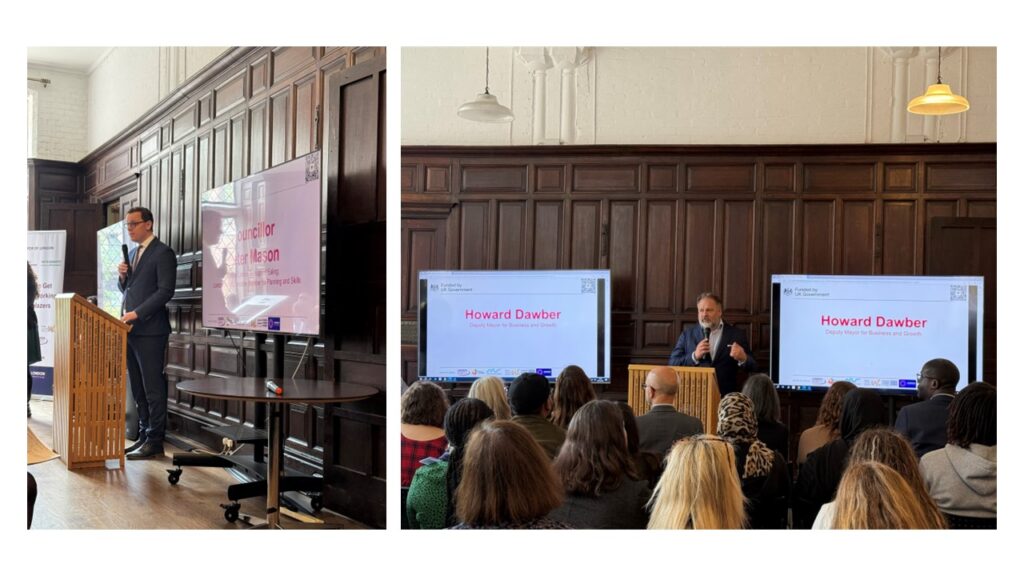
London’s Get Britain Working Trailblazers were launched at Toynbee Hall on Thursday 8 May with speeches by UK Work and Pensions Secretary Liz Kendall, London Councils’ Executive member for Skills, Cllr Peter Mason and London’s Deputy Mayor for Business and Growth, Howard Dawber.
Cllr Peter Mason, London Councils’ Executive member for Planning and Skills, said:
“With 1.3 million Londoners currently economically inactive and 1 in 5 young people in the capital unemployed, it's vital we have high-quality local support in place to help remove barriers to employment and support people into jobs and training. Not only will this benefit our residents and improve living standards, it will allow us to make most of the untapped potential and talent in our city in order to drive inclusive economic growth.
“Thanks to the Government’s £30 million trailblazer funding for London, boroughs have the investment boost we need to test new and innovative approaches, working through our sub-regional partnerships to learn what works best. These trailblazers will help pave the way for long-term transformation of employment support services, ensuring they are more integrated, deliver better outcomes and ensure the best possible value for public money."
Howard Dawber, London's Deputy Mayor for Business and Growth, said: “The Mayor is committed to getting more Londoners into good jobs.
“We have ambitious targets in the new London Growth Plan to not only create jobs but good jobs, where people can start real careers and can thrive. This funding will allow us to reach people who most need support and help them to train for good futureproof jobs.
“Working together with national Government and local boroughs will mean we can build a better-skilled workforce and a better, fairer, more prosperous London for everyone.”
The Government-backed trailblazer schemes have been launched across the UK. The nine inactivity and eight youth trailblazers across the country, backed by £170m, are a key part of the Government’s plan to Get Britain Working to put more money in people’s pockets under the Plan for Change.
London is the only region in the country to receive more than one trailblazer; there will be 5 Trailblazers with a total funding amount of £30m. The five innovative new programmes will be led by Central London Forward, Local London, South London Partnership, and the West London Alliance Sub-Regional partnerships. Sub-Regional Partnerships (SRPs) groups of boroughs working together via a single organisation.
London Councils is the collective of local government in London.
Where shared ambitions are developed, agreed, championed, and delivered at London Councils by members working together.
Where boroughs speak as one and collaborate with the government, the Mayor of London, the London public sector, the third sector, business, and other key UK and international cities.
More about London Councils here: www.londoncouncils.gov.uk
Gemma Kappala-Ramsamy
020 7934 9842
gemma.kappala-ramsamy@londoncouncils.gov.uk

Produced by independent think-tank, Localis, this report highlights key findings from conversations with frontline staff involved in helping people find work or training opportunities. This research has informed the direction of travel for the Local London Integration Hub, including the development of a sub-regional Local London Standard Framework setting out the level of service that residents should receive regardless of which borough they are in and their point of access.
We’re excited to announce that we will be launching two new programmes that will help over 16,000 people find work in our nine boroughs.
These new employment support schemes, representing around £60 million investment into the sub-region, will join our portfolio of programmes that have already helped more than 26,000 people get closer to the job market.
Both programmes will complement the services that are already available from council services and Jobcentre Plus, by helping people who may not otherwise get support.

Connect to Work is a three-year* Government-funded programme that will be available to people with disabilities, those with health conditions and people with complex barriers to employment in all nine of our boroughs.
The programme will focus on giving people the support they need to get into good work quickly and then provide ongoing support to the employer and employee to help them develop in that role.
We are working with the Department of Work and Pensions and our boroughs to finalise plans to go live this summer.
Launching soon, Trailblazers, a one-year programme, will trial innovative approaches to support people who are economically inactive into work.
This will include a mix of self-employment or business start-up support, childcare contributions, and training to help people find and stay in work.
Sign up to our newsletter to stay up to date with Trailblazers, Connect to Work, and our other employment, skills and careers support.
Discover more about our employment programmes.
*with potential to extend for a further two years.
In March, we were delighted to join partners delivering Local Skills Improvement Plans (LSIPs) across London at Business LDN’s Skills Summit 2025.
Now in its second year of delivery, London’s Local Skills Improvement Plans (LSIPs) are employer-led and data-driven blueprint for aligning training and education with current and future business needs.
The Skills Summit brought together 200 business leaders, education and training providers, government stakeholders and London’s sub-regional partnerships to celebrate the collaboration that employer-led and data-driven LSIPs have created to help close skills gaps across London.
Rt Hon Baroness Smith of Malvern, Minister for Skills, and Mete Coban MBE, Deputy Mayor for London for Environment and Energy addressed the Summit, which explored how businesses, training providers and public sector bodies can progress the transformation of skills and training in London in an era of change and new ambition.
Speaking at the event Forogh Rahmani, Director of Local London outlined the importance of the LSIP for the sub-region: “Our LSIP is the result of research with businesses and stakeholders across our nine boroughs, highlighting five key sectors and eight cross-cutting themes that we are addressing to help close skills gaps. Through the Skills Providers Network, colleges and training providers are responding positively to employers needs, developing courses and learning solutions that make the most of local resources to prepare people across our boroughs for work in high-demand and growing sectors. This is strengthening relationships and ultimately helping people gain the job skills they need to enjoy exciting careers here.”
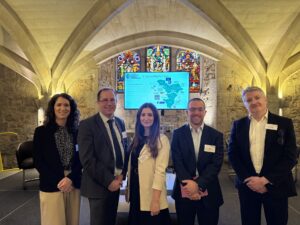
Joined by Chris Burr, Group Director – Partnership and Strategy, and Philip Bourne Digital Consultant from London South East Colleges, we shared what is happening in our boroughs with the pan-London audience. This includes the development of high-tech immersive learning suites implemented across 20 Collaborative Delivery Partners (CDPs) that will help colleges share resources and better prepare learners for work in key sectors.
Attendees also gained valuable insights into the innovative strategies and partnerships that are shaping the skills landscape in the sub-region through the Local London Skills Providers Network.
The LSIP initiative has been confirmed for another three years with a refresh planned for autumn 2025 under the oversight of Skills England, which aims to build a coherent picture of skills gaps across the country and how they can be addressed.
Find out more about our LSIP work: www.local.london/lsip
Watch the film: https://youtu.be/aOAbu9XU1ik
Our Work and Health Programme has helped over 21,000 people across our nine boroughs to either find work, training, or taken them closer to the job market.
While the programme is no longer taking referrals, our employment support team is working hard with our delivery partners to ensure people on the programme are getting the best support possible to find long-term work they enjoy.
This year already our partners have organised over 35 events and workshops to help people find work, and many more activities are planned.
One of the thousands of people who have been helped to find work and transform their lives, is Nick from Greenwich, who joined the Work and Health Programme in March 2024, facing an abrupt career change prompted by health issues. Nick was supported by Greenwich Local Labour and Business (GLLaB) who deliver our Work and Health Programme in Greenwich.

Having built a successful career in the retail industry, Nick’s forced career change due to health issues was not easy. It affected his confidence, but he was determined to rebuild his life.
Nick joined the Local London Work and Health programme and quickly received vital support from the team’s health specialists who guided him through the emotional and practical challenges posed by his health changes. This helped him adapt and foster a renewed sense of self-belief.
The Work and Health Programme team referred him onto a Level 1 Digital Skills course at Lewisham College. This proved pivotal. He embraced the learning experience, excelling in the course to the extent that his tutor encouraged him to pursue a higher-level course. To facilitate his learning, partners at Greenwich’s GLLaB team provided him with a laptop, enabling him to practice at home.
It wasn’t long before Nick showed an interest in an ‘Assembly Technician’ apprenticeship. Nick actively engaged in CV reviews and mock interview sessions. His enthusiasm was evident, and his confidence grew daily. Despite his efforts, he was unsuccessful. But Nick did not give up.
Nick continued to engage with the programme’s work club regularly, receiving support with job searches, CV reviews, and interview preparation. He also participated in recruitment sessions run by the programme, meeting with potential employers both in group settings and one-to-one sessions.
One of the defining moments in his journey was attending the annual GLLaB jobs fair. This event gave him the chance to meet prospective employers and network with key industry contacts. Notably, he met the local Mayor and this lifted his spirits.
During the event, Nick connected with a recruitment agency offering ‘Manufacturing Operator’ roles. The position involved a high level of technical skill and precision assembling mechanical and electro-mechanical sub-sea and land-based telecommunications equipment. This appealed to Nick and put himself forward to attend an assessment. His enthusiasm and potential shone, and was offered an interview.
With the support of the Work and Health programme’s employer engagement team, Nick took onboard the one-to-one tailored interview preparation. This meant he aced the interview and was offered the job!
To ensure he was work-ready, the programme provided travel-to-work expenses and high street vouchers to purchase work attire.
Since starting his new role some months ago, Nick has been thriving. He is enjoying working with his hands, and methodically assembling complex items.
Nick’s key worker at GLLAB said “Nick’s journey is a testament to his perseverance, resilience, and the power of tailored support. From navigating setbacks to embracing new learning opportunities, he has not only secured employment but also regained his confidence, self-belief, and passion for work. His ability to transition from a 20-year career in retail management to a hands-on technical role demonstrates his adaptability and commitment to personal growth.”
Find out more about our Employment Support Programmes
*Name changed.
Across the sub-region, partners are working together to help close the skills gaps prioritised in our LSIP (Local Skills Improvement Plan). Whilst we are engaging with employers to ensure that the plan delivers their needs, our partners at the Local London Skills Providers Network are bringing together training and education providers to respond to the LSIP.
Through the network, training and education providers are developing new ways of teaching skills to meet business needs.
This was showcased at the Working at Heights business breakfast hosted recently by Capital City College and the Local London Skills Providers Network for employers in industries where safety at height is critical, ie construction, building maintenance, electrical work, cleaning, and wind turbine operations.

In partnership with 3T, a leading training provider in the global offshore market, Capital City College and the Skills Providers Network have developed a suite of industry-specific courses to address gaps directly supporting LSIP priorities in construction, engineering and green jobs. These include:
The event also included a fascinating tour and demonstration of Capital City College’s state-of-the-art rope access facilities (pictured) and wind turbine maintenance workshop in Enfield, where students gain vital practical experience in maintaining and servicing wind turbines.
This free training offers local people access to hands-on upskilling opportunities in the growing green jobs sector that align both with our LSIP priorities and the UK Government’s net-zero targets.
Discover our LSIP for the sub-region
Discover the Local London Skills Providers Network
Digital connectivity is fundamental to unlocking growth across our sub-region and beyond.
We were delighted to share insights into digital investment needs across our boroughs in the Thames Estuary Growth Board’s recently launched ‘Fair Economic Growth through Digital Connectivity’ paper.
The paper sets out the Growth Board’s plan to establish the Thames Estuary region as the UK’s next AI and digital powerhouse. We back the Board’s call to action for targeted support and bold public-private sector collaboration across east London, north Kent and south Essex to drive forward the UK’s digital future.
While we have secured around £20m investment into our boroughs to improve digital connectivity, our research highlights barriers preventing us from achieving ubiquitous world-class connectivity befitting of expectation of being part of London.
As a result, we need additional funding to:
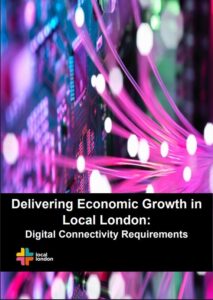
⇒Read our Delivering Economic Growth in Local London: Digital Connectivity Requirements paper.
Cllr Anthony Okereke, Chair of Local London and Leader of the Royal Borough of Greenwich, said “As the fastest growing part of the capital with a population greater than the cities of Birmingham, Manchester and Liverpool combined, we welcome the Thames Estuary Growth Board’s position paper. We are committed to creating inclusive growth for people and businesses in our sub-region; investment in digital infrastructure to tackle over 100,000 premises without gigabit capable broadband connectivity is fundamental to achieving this and supporting local, regional and national economic growth.”
Mayor Rokhsana Fiaz OBE, Local London representative of the Thames Estuary Growth Board and Mayor of Newham London, said “We know that digital inclusion is vital for our people as the impact of technology and the digital age is changing how we live and accessibility will inform life chances. The government has placed a priority on addressing digital access because the digital exclusion numbers are stark, with 1.6 million people in the UK currently not online. Across the Local London area it is even more pronounced, with 100,000 premises not connected or amongst the lowest level of digital capability meaning that the opportunities of life are curtailed.
That’s why we have an ambition through our involvement in the Thames Estuary digital corridor, which will bring high-speed connectivity to east London as this report sets out. It will enable digital inclusion for our people so that they can seize the opportunities of economic growth, over sustaining digital ‘not spots’ which is holding our people back. That’s why fair economic growth through digital connectivity in our boroughs and across the Thames Estuary region is a must.”
Below: map showing slow and no connectivity areas in Local London boroughs and beyond.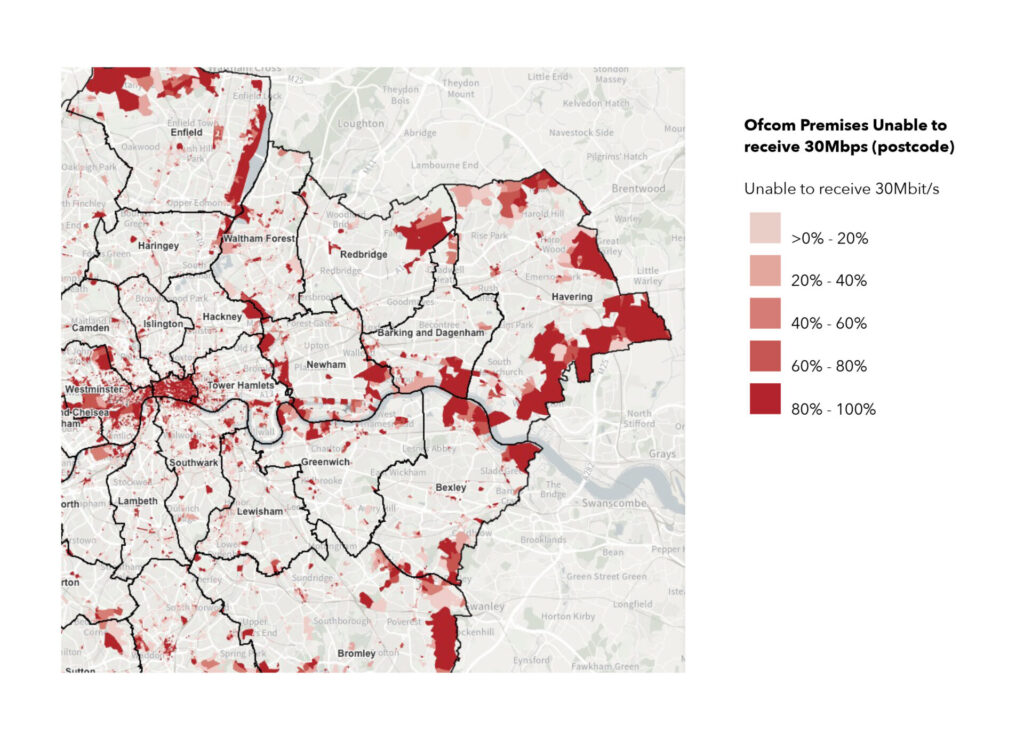
The Thames Estuary region, one of two nationally important growth corridors intersecting the Local London sub-region, has the potential to add £190bn to the UK economy by 2050[1].
The Local London economy represents around £55bn[2], with potential to increase with the right investment. Our boroughs are working together through Local London to unlock sustainable inclusive growth across north east and south east London.
[2] ONS snapshot data from 2022 (not adjusting for inflation)